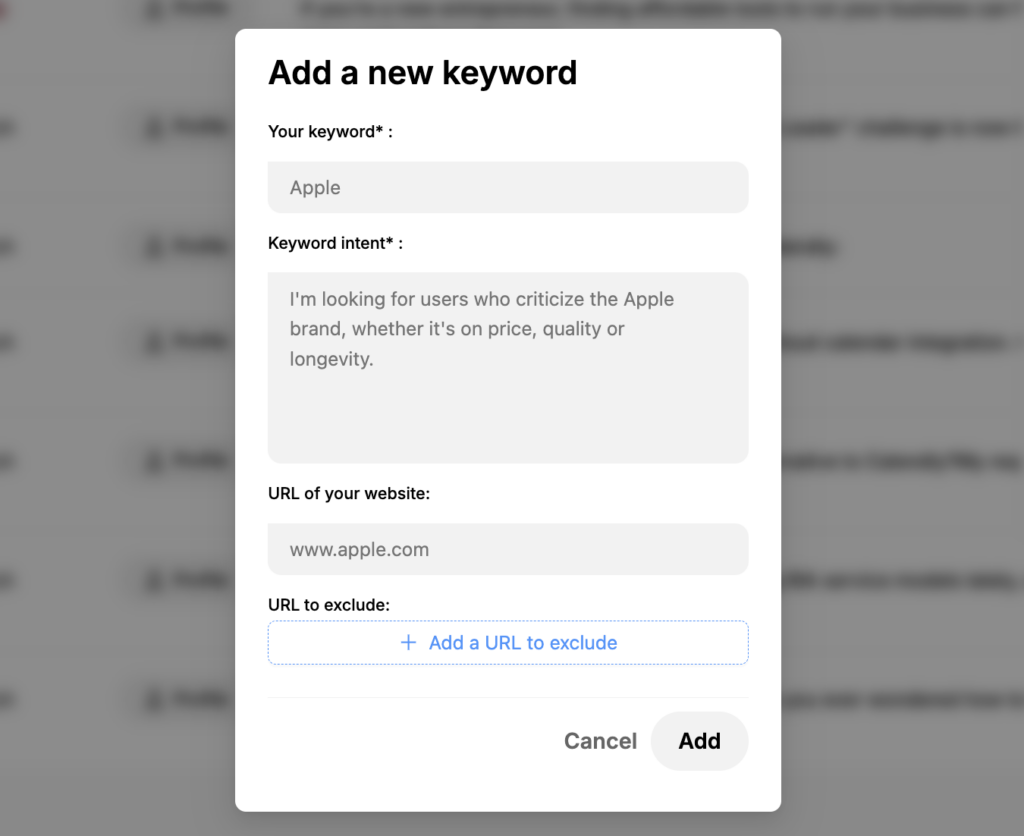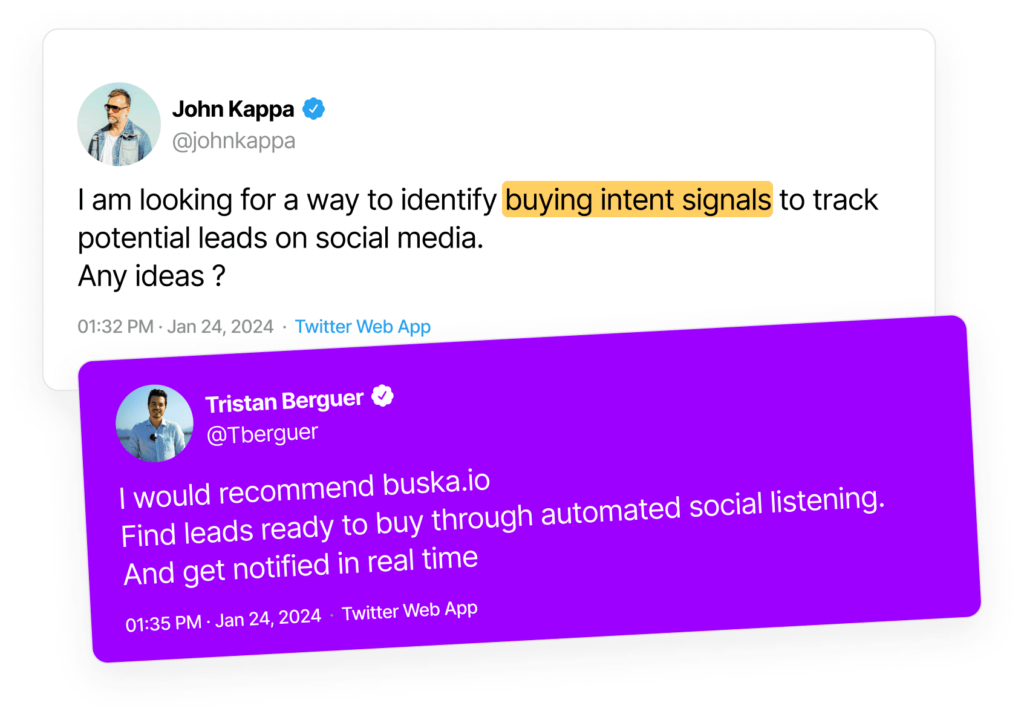6 formas de potenciar la escucha social para generar clientes potenciales

Desea encontrar clientes que ya está hablando sobre lo que ofrece?
Empieza por controlar las palabras adecuadas.
Las palabras clave actúan como un mapa del tesoro que le conduce a las conversaciones y personas más importantes.
Pero, ¿por dónde empezar?
Supervisar tu propia marca es fácil - introduzca su marca - pero ¿qué debe introducir para encontrar clientes potenciales cualificados que no mencionen directamente a su empresa?
Elegir las palabras clave adecuadas es el primer paso para obtener grandes resultados con la escucha social.
De este modo, podrá centrarse en las personas adecuadas y conectar con clientes potenciales listos para comprar.
Una vez que sepa qué palabras clave desea rastrear, puede introducir hasta 10 palabras clave en buska para captar a todos los clientes potenciales cualificados.
Aquí tiene 6 formas de potenciar la escucha social para la generación de leads.
1. Piense como sus clientes
Empiece por preguntarse: ¿Qué palabras utilizarían sus clientes si buscaran su servicio o producto?
- Busque frases como "alternativa a [competidor]" o "mejor que [el producto de la competencia]".
- Preste atención a cómo habla la gente de sus necesidades en Internet. Puede que digan cosas como "Estoy cansado de [problema]" o "buscando ayuda con [reto específico]".
Sus palabras clave deben coincidir con su lenguaje, no con las palabras de moda del sector.
Para ello, asegúrese de tener claro su perfil de cliente ideal (PCI):
- ¿Quiénes son? Identifique su sector, funciones y tamaño de la empresa.
- ¿Cuáles son sus necesidades? Céntrese en sus puntos débiles y en las soluciones que podrían buscar.
- ¿Dónde se conectan? Averigua qué plataformas frecuentan y el tipo de contenidos que consumen.
Esta información le ayudará a seleccionar palabras clave que se ajusten a su intención y a sus pautas de participación.
2. Utilizar temas específicos del sector
Haga una lista de los términos especializados que utiliza la gente en su campo:
- Incluya palabras exclusivas de sus servicios o productos. Por ejemplo agencia de marketing podría rastrear "herramientas de análisis social" o "seguimiento de la audiencia en tiempo real".
- Añada términos relacionados con tendencias o temas candentes de su sector.
¿Qué está zumbando ahora mismo? Mantén la oreja pegada al suelo. - Controle las variaciones de la terminología de su sector o nicho, incluidos los acrónimos y la jerga utilizados en el sector.
3. Añadir palabras de acción
Diríjase a personas dispuestas a actuar incluyendo palabras clave con intención:
- Palabras como "encontrar," "contratar," "comparar," o "recomendar".
- Frases para resolver problemas como "arreglar mi [problema]" o "ayuda con [asunto específico]".
- Expresiones como "dificultades" o "retos" seguidas de temas relevantes.
Es probable que las personas que utilizan estas palabras estén dispuestas a tomar una decisión.
4. Incluir alternativas y menciones de la competencia
A veces, los clientes potenciales ya están buscando otras opciones:
- Añade los nombres de los competidores, incluidos los errores ortográficos comunes.
- Utilice frases como "alternativa a [competidor]," o "por qué cambiar de [competidor]".
Si los supervisa, podrá encontrar a personas descontentas con su solución actual y ofrecerles una mejor.
Esta táctica también ayuda a los equipos de crecimiento y producto a comprender su mercado y realizar análisis competitivos.
5. No olvide la ubicación ni los grupos específicos
Si su empresa sirve a zonas o personas concretas, puede intentar ser preciso:
- Incluya nombres de ciudades o regiones como "[su servicio] en Nueva York."
- Si su público está segmentado, añada términos para grupos, como "pequeñas empresas". "autónomos". o "soluciones empresariales".
Esto ayuda a reducir el campo a las personas a las que realmente quiere llegar.
6. Seguir probando y ajustando
Tenga en cuenta que las palabras clave no son estáticas y que las preferencias y la comunicación de su público objetivo evolucionan. Actualice sus palabras clave con regularidad:
- Comprueba lo que funciona.
- Elimine las palabras clave que aporten menciones irrelevantes o demasiado ruido.
- Añada nuevas frases en función de la evolución de las tendencias y los comentarios de los clientes.
- Prueba A/B de palabras clave. En buskaPuede cambiar las palabras clave que está rastreando como desee.
La escucha social consiste en ser flexible y reactivo.
Conclusión
Las palabras clave adecuadas marcan la diferencia. Compartimos 6 formas efectivas de definir palabras clave relevantes. Pero la clave es: probar y aprender.
Utiliza la lista de 10 palabras clave de Buska para hacer A/B y variar tu enfoque: marca, nicho, punto de dolor, competencia...
Cuando elige términos que coinciden con la forma en que sus clientes hablan en Internet, encuentra mejores clientes potenciales.
No tengas miedo de ser específico o de modificar tu lista sobre la marcha.
Pruebe buska durante 7 días de forma gratuita y empezar de inmediato.
¿Desea profundizar en las tácticas de generación de contactos B2B para una plataforma específica?
Consulte nuestras guías especializadas:





